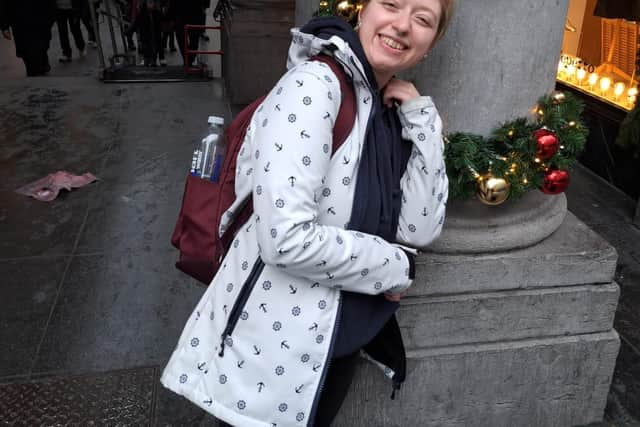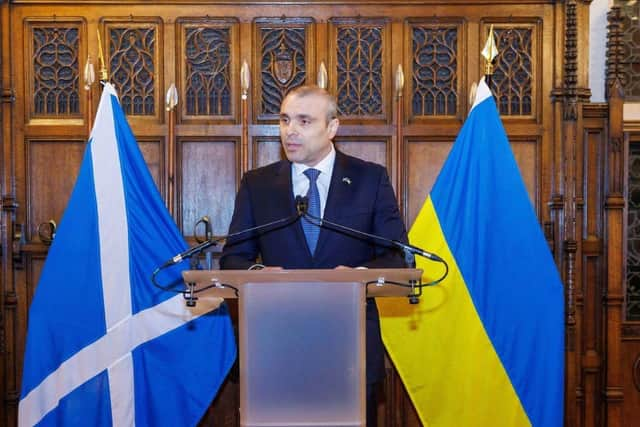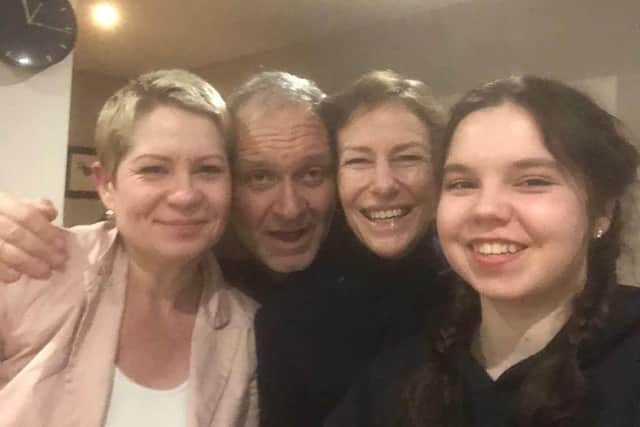Ukraine one year on: ‘I don’t feel like it is going to end soon’
"That morning is embedded in my head,” says Mr Kuslii, who then worked at the Foreign Ministry of the Ukrainian government.
“I saw the news on my phone first of all. Then I was out walking early with my dog and my two children and we heard shelling from where we lived. My children were very scared.”
Advertisement
Hide AdAdvertisement
Hide AdIn the early hours of the morning, Russia launched a full-scale invasion on Ukraine. Minutes after Russian president Vladimir Putin announced his plans, air strikes and a ground invasion began across the country – towards Kharkiv and Kherson in the east, to the capital Kyiv, in the north and on an airport near Ivano-Frankivsk, in the west.


There had been rumblings that Russia was mulling an attempt to take more territory in the already conflict-hit eastern Donbas region of Ukraine, where troops had invaded in 2014 and which were already controlled by Kremlin-backed authorities. Crimea had been occupied, and subsequently annexed, the same year by Russian troops. However, few had expected the attack would span the whole country.
A meeting of Foreign Ministry staff was hastily called. Despite his high-profile position within the government, even Mr Kuslii had no idea the invasion had been about to begin.
"The decision was made to go to the Ministry and we had a couple of working meetings where the decision makers instructed us about further steps,” he recalls.
"There was some information about a possible invasion and possible act of aggression, but our war with Russia had been going on since 2014. All the time, we were in the process of fighting. Of course, we were on alert. But exactly the day, we didn't know.”


In December, Mr Kuslii, who had served as consulate for Scotland a few years earlier before returning to Ukraine in 2020, was told he would be posted back to Edinburgh to help deal with an influx of tens of thousands of refugees who had arrived on the Homes for Ukraine scheme.
But his return – and the removal of his family to a safe place – was bittersweet.
"I don't know how to describe this feeling, but it's difficult to get used to,” he says. “I think about Ukraine all the time, how people in Ukraine are doing without electricity, without water. Every day, our territory is under attack from missiles.
Advertisement
Hide AdAdvertisement
Hide Ad"From one side, I understand that now, I'm here. My family's here, we're safe. From the other side. I realise that my friends, my colleagues, are in Ukraine and are at risk all the time. You're not calm, you can’t chill out. You're responsible for everyone who is not with you. It's difficult.”


Student Varvara Shevtsova, 19, understands Mr Kuslii’s feelings.
She has settled well into her new life as a postgraduate student in social work at Dundee university, after initially living with a host family in Montrose under the Homes for Ukraine visa scheme. Yet the memories of war are still with her.
"It's like I'm a different person now, but sometimes something still triggers me,” she says, explaining how when February rolled around, she began to feel physically ill – a response she now recognises as her body responding to the anniversary of the beginning of the invasion.
“Like when I’m walking in a rural area, and someone is scaring the birds with gun shots, it sounds like explosions back in Kyiv. But it is easier now. When I compare myself from April 2022 [when I first came here] to now, it is very different.”
She speaks about her feelings of guilt – of being “able to eat Oreos for dinner whenever I like” or feeling like she can plan far enough ahead to book tickets for a rock concert in four months’ time.
"It comes to me with pangs of conscience, because I think of how things are for my friends in Ukraine, it’s very hard to plan ahead, to plan your life and here I am, enjoying my life,” she says. “My mum says she's happy for me because I'm happy here and she doesn't want me to go back and to be in constant danger just because I'm feeling guilty.”
Her mother, who fled to Germany at the beginning of the war, has now returned to Kyiv to look after Ms Shevtsova's father, who recently suffered a heart attack after a year serving in the fire service.
Advertisement
Hide AdAdvertisement
Hide Ad"She is happy to be home and looking after my father,” says Ms Shevtsova. “But I don’t know whether she will stay there or not. She doesn't know what's going to happen next. And I still have those concerns. When it was a massive wave of warfare last year, maybe it will be nuclear war this year. So we don't know and nobody knows, but she doesn't try to plan anything for the next day. It's like, she lives through today. And that's fine.”
She is not optimistic for Ukraine’s short-term future.
“I don't feel like it's going to end soon,” she says. “Having this neighbour – Russia – living next to us, it's like Israel and Palestine. They will always have this sort of conflict and always they will be in this sort of state.
"This life taught me to hope for the best, but prepare for the worst. I'm not an optimist. When you see the visit of [US president Joe Biden] to Ukraine this week, he said it is going to be a tough month, a tough year, and maybe a tough decade for Ukraine and I completely agree. Our infrastructure is destroyed, our economics is destroyed. Our cities are destroyed, our people are killed.”
Near the end of last year, the war took a different turn, as Russian military strategy began to focus on destroying infrastructure, such as electricity lines and power stations, causing widespread blackouts. Some areas of the country were left in freezing winter conditions, without electricity or heat, for days at a time.
Ivan Koperlos, an English teacher in the west of Ukraine, close to the Hungarian border, believes he has been lucky, compared to those living elsewhere in the country.
His home, in a village in a mountainous region, has not suffered any direct attacks – bar one rocket that landed a few miles away. His rural property already had a small emergency generator, while the family draws their water directly from a well.
However, the area has still been hard hit by power cuts over the past few months, with rolling blackouts cutting electricity to just a couple of hours a day, while he regularly has to take his classes to underground bomb shelters during lessons.
The school he teaches at is able to hold in-person classes as it has a bomb shelter. According to government rules, any school that does not have a suitable shelter has to teach online. However, this week, his students have returned temporarily to remote learning as a precaution due to fears that Russia may escalate attacks further to mark a year since the invasion began.
Advertisement
Hide AdAdvertisement
Hide Ad"We have an air raid alert two or three times a week,” he says. “When the first air raid siren went off, some of the students were stressed. My daughter is in first grade and she was crying. But we have a practice of talking normally to them, telling them, this is just a precaution, we have to do it and so on.”
Despite being geographically removed from the front line, the death toll in Mr Koperlos's small community is growing each week. He recently suffered the loss of a close friend serving in the army, while a student from his school was also killed. As a teacher, he is counted in the “fourth wave” of military mobilisation, something he says will only happen “if everything is absolutely terrible”.
"We have local Telegram chats and almost every day we see there is someone being brought back – a body,” he says. “That is the main thing that reminds us here that it’s a war.”
He says some people around him are more pessimistic about the day-to-day situation, but that he wants to remain optimistic for the sake of his wife and two young children.
“I try to be very objective," he says. "I have to be strong and protect my family. If I'm calm, and not nervous, everything is OK.
"There are some people who still say ‘why don’t we just be part of Russia?’. I say ‘what are you talking about? Are you kidding me?’ They have different reasons for that – some just want the war to be over.
"But I tell them, just imagine a Russian assault on our village. They would kill me first, as I am a potential warrior. Then they would rape my wife, kill my kids. They would do as they did in Bucha."
Bucha, a town close to Kyiv, was ravaged by Russian troops in the early months of the war. Many civilians were killed and abused in acts of horrific brutality which have been described by international organisations as war crimes. Since then, however, Russian forces have retreated from the Kyiv region, focusing instead on the east of the country.
Advertisement
Hide AdAdvertisement
Hide AdIn Fife, Liudmyla Harus and her daughter Violet anxiously await the day they will be able to return home to the eastern city of Kharkiv, which was subject to one of the first major bombardments on the day the invasion began. While Kharkiv itself has not been occupied by Russian troops, part of the surrounding area has and territory is still being fiercely fought over by Ukrainian and Russian soldiers.
After living with hosts under the Homes for Ukraine scheme, the Harus family has recently moved into a rented flat in Cupar, where Ms Harus works at a chiropractor’s surgery.
"I wait for good news every day,” says Ms Harus. Violet’s father, an ambulance driver, as well as her grandmother and uncle, are still in Ukraine. “But we will not go back now, not until it is safe.”
Violet says she has been impressed by her country’s response to the invasion.
"This war has taken many, many lives, but it has also brought Ukrainians to be united,” she says. “I’m really proud that I was born in Ukraine and that I am Ukrainian.”
Comments
Want to join the conversation? Please or to comment on this article.